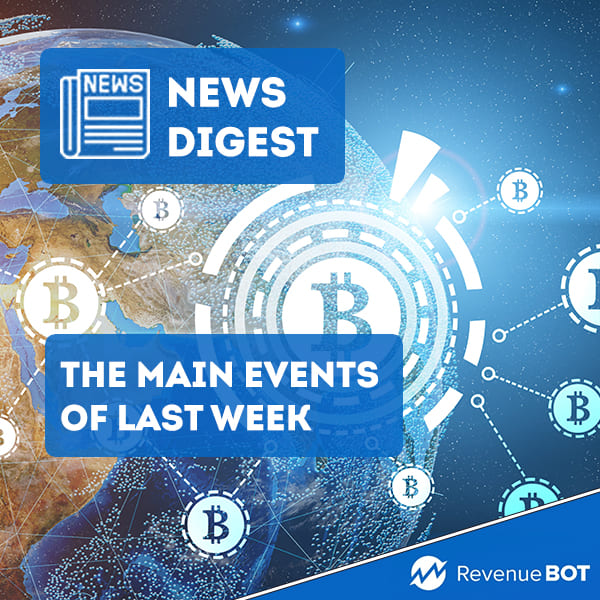
Friday, July 14th. As the week comes to an end we can focus on the highlights of the crypto industry over the past few days.
Spot trading volume on CEXs collapsed by 36%
In the Q2 2023, total spot trading volume across the top 20 bitcoin exchanges sank 36%, from $2.6 trillion to $1.66 trillion, CoinMarketCap’s report says.
Throughout the past six months, Binance keeps its market power by dominating with a 59.9% share. Meanwhile, the top 5 platforms account for about 85%.
From the token supply perspective, centralized crypto exchanges (CEX) support a large number of trading pairs and coins, capturing the constant expansion of listing admissions. Binance remains at the forefront of the large-cap sector focusing on “popular and high quality” assets.
Likewise, Binance ranks first by reserve assets amounting to $57 bln, followed by OKX and Bitfinex with $10 bln each.
The total value of customer collateral remained roughly flat compared to the previous reporting period. The majority of the reserve assets comprise BTC and a variety of stablecoins.
Over the H1 2023, most exchange-traded tokens achieved net positive yields. However, most of them failed to outperform bitcoin – +182% YTD.
Total trading volume on decentralized exchanges declined 24% to $189 billion in the second quarter, with Uniswap retaining its prevalence with a market share totaling 57.5%.
Traders still favor centralized exchanges, but the DEX to CEX ratio has widened to about 1:8.
As per analysts, the current market situation is similar to the conditions observed during the recovery phase after the collapse of FTX.
As you may remember, the total trading volume on crypto exchanges has plunged to its lowest level since the fourth quarter of 2020 if we consider the results of April-June 2023.
Over the last month, Russian users took the lead in terms of visits to the largest trading platforms. Nonetheless, overall traffic to CEXs saw an 8% decline.
GameFi apps are coming to Google Play
Google’s renowned app store for Android-based devices will feature games and dApps with options to buy, sell and earn digital assets.
The tech giant attributed the initiative as a move aimed at supporting the needs and ambitions of developers.
The partner of Google in its realization turned out to be Reddit.
“From reimagining traditional games with user-owned content to boosting user loyalty through unique NFT rewards, we’re excited to see creative in-app experiences flourish and help developers expand their businesses,” wrote Google Play Group Product Manager Joseph Mills.
He emphasized that due to the widespread fraud in the crypto space, Google will take any measures to protect users.
“We’re requiring that apps be transparent with users about tokenized digital assets,” Mills pointed out.
dApps devs should indicate in the Play Console that their offering has blockchain elements. In this regard, they are expected to be in line with Google Play’s Real-Money Gambling, Games, and Contests policy.
Earlier, Axie Infinity, a blockchain-based game, became available on App Store across a number of countries.
To recap, Reddit announced collectible avatars powered by the Polygon blockchain back in July 2022. However, the platform does not identify them as NFTs and accepts payments in fiat only.
STEPN to hold a giveaway in crypto to promote new game
Find Satoshi Lab, which developed the M2E project STEPN, will be giving away 2 million GMT tokens as part of a marketing campaign for its all-new game dubbed Gas Hero.
Participants in the three months-long contest are challenged to come up with item or character designs for an upcoming project.
“Winners will be selected based on the originality of the theme, design quality, and background story,” the company said in a statement.
Find Satoshi Lab’s development is expected to see the light of day as early as late 2023. Gas Hero is a novel MMO project playable through Web and mobile.
The plot of Gas Hero unfolds in the year 2084, once the actions of an evil AI have led to a nuclear apocalypse, according to the developers. Users can battle each other and build their own camp.
Bank of China trials offline payment for digital yuan
One of Celestial Empire’s largest state-owned banks, Bank of China, is testing a new offline payment method for digital yuan (e-CNY) linked to SIM cards.
As part of the initiative, the institution has partnered with telecom operators China Telecom and China Unicom.
With NFC-enabled SIM cards, users will be able to make payments using their phones by connecting the national digital currency application. This implies that payments may be processed even if your device is turned off.
Initially, the feature will be available on Android and purely in certain areas of China.
The PRC have already been testing the digital yuan for three years. As of late 2021, e-CNY transaction volume reached 87.57 billion yuan (~$13.68 billion), with 261 million unique wallet addresses registered.
The pilot tests took place in Shenzhen, Suzhou, Xiong’an, Chengdu, Shanghai, Hainan, Changsha, Xi’an, Qingdao, Dalian and the Winter Olympic Games area. The named cities will continue to utilize the tool.
In April 2022, former People’s Bank of China governor Zhou Xiaochuan noted that e-CNY is mainly intended for the public and merchants, rather than to replace SWIFT or “be used as a weapon.”
